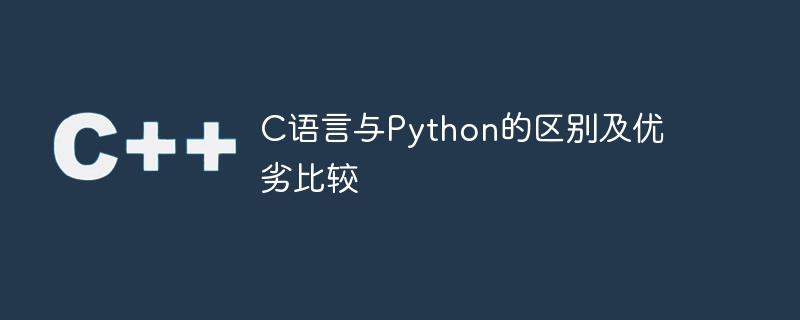

Differences and comparison of advantages and disadvantages between C language and Python
C language and Python are two popular programming languages, and they have obvious differences in many aspects. This article will conduct a detailed comparison between C language and Python, analyze their advantages and disadvantages, and demonstrate the differences between them through specific code examples.
1. Syntax differences:
C language is a statically typed programming language. It is necessary to specify the data type of variables when writing code, and the syntax is relatively strict. Python is a dynamically typed programming language that does not require explicit specification of variable types and has a more flexible syntax.
For example, the following is a comparison of a simple variable declaration and an output statement:
C language example:
#include <stdio.h>
int main(){
int num = 10;
printf("%d
", num);
return 0;
}Python example:
num = 10 print(num)
In C language, you need to use the int keyword to explicitly declare the type of the variable as an integer type, while Python does not need to specify the type of the variable.
2. Differences in applicable fields:
C language is suitable for systems programming, embedded development and other scenarios that have higher performance requirements. Python is suitable for rapid development, data processing, scientific computing and other fields.
For example, the following is a comparison of a simple quick sort algorithm:
C language example:
#include <stdio.h>
void quicksort(int arr[], int low, int high){
//Quick sort algorithm implementation
}
int main(){
int arr[] = {5, 2, 9, 1, 5};
quicksort(arr, 0, 4);
for(int i=0; i<5; i ){
printf("%d ", arr[i]);
}
return 0;
}Python example:
def quicksort(arr):
#Quick sort algorithm implementation
return arr
arr = [5, 2, 9, 1, 5]
arr = quicksort(arr)
print(arr)In C language, you need to manually implement the quick sort algorithm, but Python has built-in convenient sorting functions such as sort(), so developers do not need to implement the sorting algorithm themselves.
3. Difference in code length:
Due to the relatively cumbersome syntax of C language, some simple operations may require a larger amount of code. In contrast, Python's concise syntax can reduce the amount of code and improve development efficiency.
For example, the following is a simple comparison to determine odd and even numbers:
C language example:
#include <stdio.h>
int main(){
int num = 10;
if(num % 2 == 0){
printf("Even number
");
}else{
printf("odd number
");
}
return 0;
}Python example:
num = 10
if num % 2 == 0:
print("even number")
else:
print("odd number")In Python, the code is more concise and clear than C language.
4. Difference in readability:
Python is famous for its concise syntax and elegant style, making the code easier to read and understand. In comparison, the syntax of C language is relatively complex and less readable.
To sum up, C language is suitable for fields with high performance requirements, which require manual memory management and more detailed control; Python is suitable for rapid development, data processing and other scenarios, and is more suitable for beginners to learn. and applications. When choosing between using C language or Python, you should make a reasonable choice based on your specific needs.
I hope that through the detailed comparison in this article, readers can better understand the differences and advantages and disadvantages of C language and Python, and choose more suitable tools for their own programming learning and practice.
The above is the detailed content of Differences and comparison of advantages and disadvantages between C language and Python. For more information, please follow other related articles on the PHP Chinese website!
 python development tools
python development tools
 C language variable naming
C language variable naming
 The difference between static web pages and dynamic web pages
The difference between static web pages and dynamic web pages
 What is the difference between 4g and 5g mobile phones?
What is the difference between 4g and 5g mobile phones?
 python packaged into executable file
python packaged into executable file
 The difference between k8s and docker
The difference between k8s and docker
 what python can do
what python can do
 Self-study for beginners in C language with zero foundation
Self-study for beginners in C language with zero foundation




